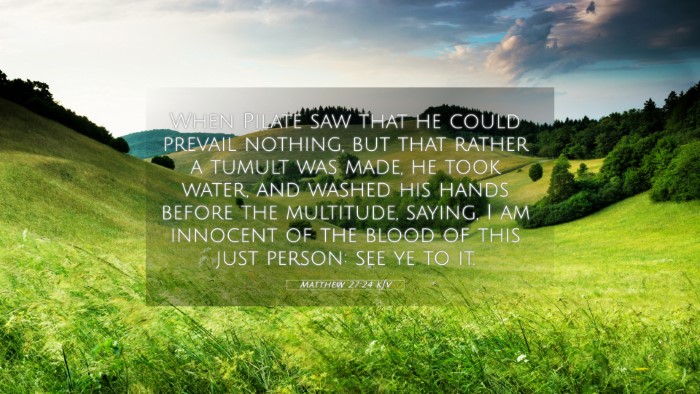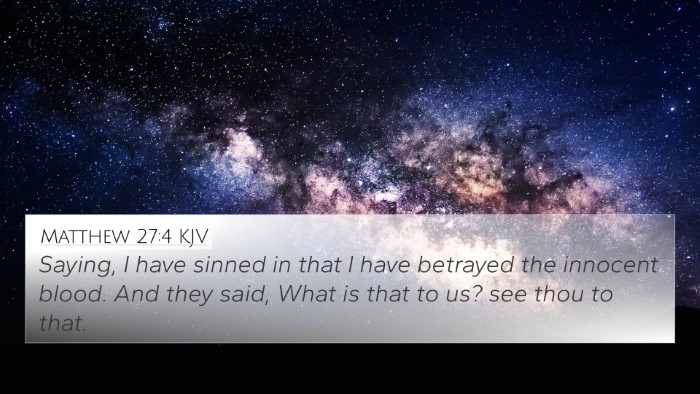Understanding Matthew 27:24
Matthew 27:24 presents a profound moment in the Passion narrative where Pontius Pilate, the Roman governor, expresses a symbolic act of relinquishing responsibility for the condemnation of Jesus. This verse highlights themes of accountability, justice, and the fulfillment of prophecy. Below, we explore the insights provided by renowned public domain commentaries, along with cross-references that enhance our understanding.
Verse Context
In Matthew 27:24, Pilate declares, "I am innocent of this man's blood; see to it yourselves." This statement comes after the Jewish leaders insist on Jesus' crucifixion, thereby placing Pilate in a complicated moral dilemma. He attempts to absolve himself of guilt by washing his hands, leading to the declaration of innocence.
Commentary Insights
Matthew Henry's Commentary
According to Matthew Henry, Pilate's act of washing his hands symbolizes an outward ceremony of innocence that fails to address the moral implications of his decision. Henry notes that Pilate acknowledged the innocence of Jesus but chose political expediency over justice, exacerbating his accountability.
Albert Barnes' Notes
Albert Barnes elaborates on the concept of Pilate's washing his hands as a futile act that does not exempt him from the consequences of his actions. Barnes emphasizes the gravity of Pilate's choices and the collective responsibility of the people who clamored for Jesus' crucifixion, pointing out that their choice led them into a state of spiritual blindness.
Adam Clarke's Commentary
Adam Clarke discusses the historical and cultural significance of Pilate's statement. Clarke suggests that the washing of hands was a traditional Jewish legal practice signifying the cleansing of guilt. He draws parallels to how individuals deny their moral responsibilities and highlights Pilate's inner conflict, portraying him as a tragic figure caught between justice and the will of the masses.
Thematic Connections
This verse serves as a poignant reflection of human nature regarding accountability and truth. The act of washing hands can be metaphorically linked to contemporary experiences where individuals seek to evade responsibility for their actions.
Related Bible Cross-References
- Genesis 4:9 - Cain's denial of responsibility for Abel's murder.
- Luke 23:4 - Pilate's initial declaration of Jesus' innocence.
- Matthew 26:66 - The judgment of those who condemned Jesus.
- John 19:12-16 - Pilate's struggle with the Jewish leaders over Jesus' fate.
- Acts 3:14-15 - Peter's reference to the rejection of the holy and righteous one.
- Isaiah 53:3 - The prophecy of Jesus being despised and rejected by men.
- Luke 18:11 - The Pharisee's self-righteous attitude contrasted with the publican's recognition of sin.
Inter-Biblical Dialogue
Matthew 27:24 ignites an inter-Biblical dialogue about the nature of guilt, the quest for innocence, and the fulfilling of divine prophecy within the framework of human governance. These themes can be seen echoed in various parts of both the Old and New Testaments.
Exploring Accountability and Guilt
The biblical narrative often emphasizes the weight of moral responsibility. Pilate’s actions reflect a broader human tendency to avoid facing the consequences of one's decisions. Learning from this can guide our understanding of justice and mercy within our own lives.
Conclusion
In summarizing the meaning of Matthew 27:24, it is clear that this moment encapsulates the tension between political power and moral duty. The insights from commentaries enrich our understanding of Pilate’s tragic role and his ultimate failure to seek true justice. By cross-referencing this verse with others, we build a comprehensive view of the biblical themes related to innocence, guilt, and the complexities of human choices.
Further Study
For deeper exploration into how this verse connects with others, consider utilizing tools for Bible cross-referencing such as concordance and comparative studies. Understanding the relationships between various scriptures can enhance one’s grasp of biblical narratives and their thematic implications.
















